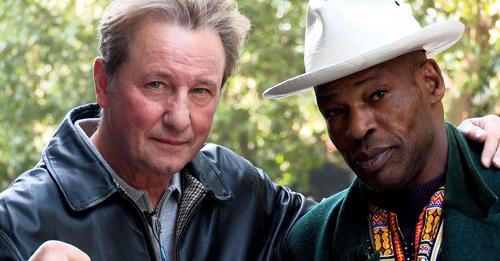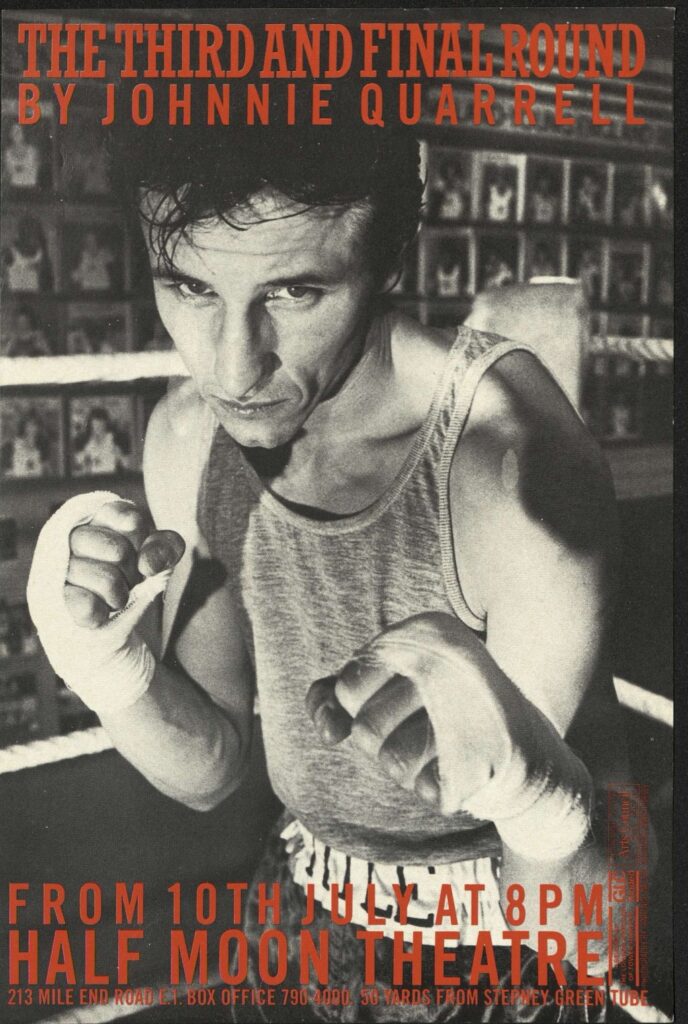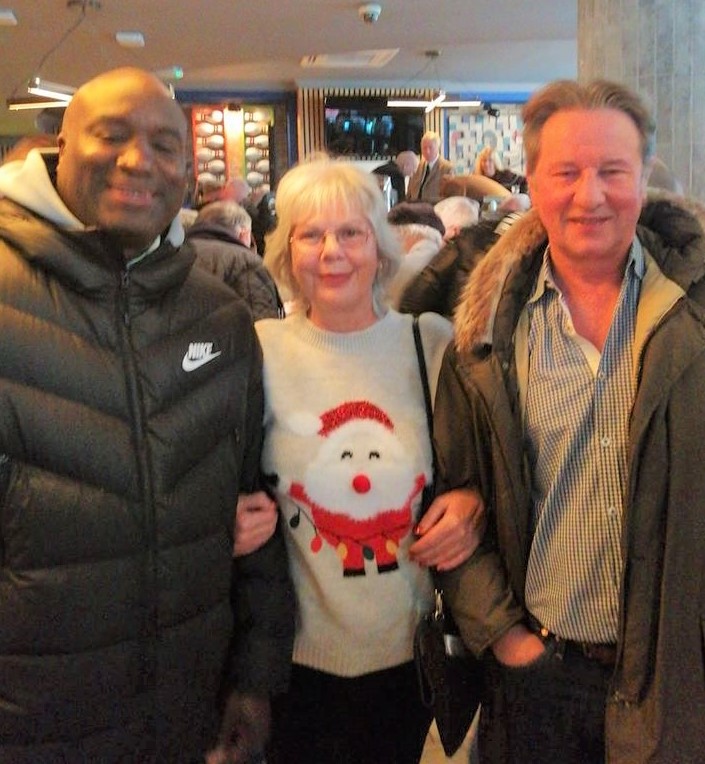
They used to call him ‘The Wapping Assassin’ and, when he was in his boxing prime, Jimmy Flint was one of the most feared punchers in the British featherweight division. Always fierce and electric to watch, Jimmy was a big favourite with the London crowds, but he never let that go to his head. He wasn’t that type of man, although he still remains very proud of the fact that Johnny Owen once asked him for his autograph in the changing room. Jimmy started boxing as a tiny tearaway at Broad Street in Stepney before joining Repton boxing club in Bethnal Green, where he became national junior ABA champion, he won the NABCs and the London ABAs as a senior.
“When I first boxed, I used to weigh 4st 7lb and, to be honest, I was a little sod. I was always fighting on the street all the time. But, even back then, I had to throw loads of punches. They always used to talk about me being a hard puncher, but I worked so hard at learning to become a puncher. I’ll never forget watching José Nápoles talking on the television when he was a younger man about how he practised his punching power, how he turned his body and used his feet. So I got a mirror and, after I’d been out running for an hour or so, I used to just practise moving my feet backwards and forwards and pushing my hands forward. Then, as I reached about 16 years old, I started knocking lots of people out with a short right-hand punch, and then the left hook over the top came as I got a bit older. But it ain’t just power. It’s technique. My dad used to say to me ‘Jimmy, punch like the pistons of a steam-train.’”
Jimmy turned professional with Terry Lawless and Mickey Duff, training at the Royal Oak in Canning Town alongside the likes of John H. Stracey, Johnny Waldron, Dave Armstrong, Charlie Magri, Maurice Hope, Jimmy Batten, Sylvester Mittee and Kirkland Laing, the latter of whom always brings a smile to Jimmy’s face. “Kirkland was a lovely bloke. He had such a nice nature and he was a proper character. When he used to sit in the corner between rounds, he used to whistle! Me and Kirkland used to go running together a lot and we used to spar with each other all the time. I sparred with Sylvester Mittee and he was okay with me, Sylvester was. He moved well. I sparred with Jimmy Batten a thousand rounds and I sparred with John Stracey, Maurice Hope, all of them.”
In 1973 at the age of 23, Jimmy made his professional debut and, three and a half years later, he won the Southern Area featherweight title by stopping Mark Bliss in the fourth round at the Royal Albert Hall. Big things were expected from Jimmy Flint by the boxing business, and he expected big things of himself. “The truth is that the Southern Area title was just a steppingstone to the next one as far as I was concerned. I was miles away from where I wanted to be. Mark Bliss was a very good fighter. I’m sure he could have been British champion, but I just got in his way. I went on to box for the British title against Pat Cowdell, but I wasn’t myself in that ring that night and he won our fight fair and square. Lawless and Duff had a few featherweights, and they held me back and held me back, not that I’m saying it was a bad thing. I was 30 nearly when I was finished. In my day, 30 was old, and I didn’t want to box on beyond 30.”
There was no official retirement announcement. Jimmy’s boxing career came to a halt in a somewhat circumstantial fashion. After his thirtieth and final fight, while he was waiting for a promised phone call that never came, he began to realise that he didn’t need boxing anymore and he made the decision to walk away. He never made much money between the ropes and boxing certainly never did him any favours, but Jimmy was never the kind of man who expected any favours.
“I was raised in two rooms with an outside toilet. I’ve never asked anybody for nothing. I didn’t expect anyone to give me any money, like they have these tribute nights for fighters to get them some money. No one gave me nothing, so I thought ‘Well, I’m going to have to go to work.’ So I got a job at the casino driving their big spending punters about. I got the job because I knew the fella in charge. He was an amateur boxer. He knew I was no chauffeur, but he gave me the job anyway. I never used to speak too much to people because I had no vocabulary. My dad used to do all the talking. But, when I got that job, I started to earn real money and become independent, and it changed my whole life.”
“That was when I became an actor. One day, this guy called Johnnie Quarrell knocked on my door. He had written a play called The Third and Final Round and it was being put on at the Half Moon Theatre, and he wanted me to do down there to get involved. I still looked very young and I played an amateur boxer, and then the director said to me ‘Listen, Jimmy, you’re a cockney and we’d like you to speak.’ I said ‘If I’m no good, drop me out.’ So I started speaking, and that’s how it started. Then the film director, Ron Peck, put me in a film called Empire State and it all took off from there.”
Jimmy’s association with Ron Peck formed the foundation for two iconic boxing films. First was the compelling documentary, Fighters, in which, at one point, Jimmy is being interviewed by Peck in Jim’s mum’s front room. The moment when Jimmy stands over Peck with such understated menace while he calmly confides that he might “let one go” when he’s walking down the street is classic. Then came the film, Real Money, in which Jimmy Tibbs plays an old-school boxing trainer and Jimmy Flint is a malevolent drug dealer who is blatantly stealing Tibbs’ fighters away and setting them on the road to hell. The story builds to a sensational showdown between the two Jimmys, when Tibbs smashes Flint across the face with the butt of a gun.

“I’m still great friends with Ron Peck. I’ve learned a lot from Ron, and another man who I’ve learned a lot about acting from is Stephen Berkoff. I first met Stephen when we were in the film, The Krays. Stephen taught me all about Shakespeare and I acted in one of his plays called Brighton Beach Scumbags. I’m there with all these actors and, when the play first opened up, they said to me ‘Jimmy, are you nervous?’ I said ‘Why should I be nervous? I’ve boxed in the Albert Hall in front of thousands of people. Do you think I’m nervous getting on the stage? No one’s gonna hit me.’ The thing with acting is you don’t get many working class people like me. This lot were all talking about how they went to RADA and the Guildford School of Arts and all that. Then they asked me ‘Where did you train, Jimmy?’ I told them ‘I did my training at the Thomas A’Becket and the Royal Oak!’”
Jimmy might not have been punched in the face during his acting career (although the gun thing with Jimmy Tibbs looked pretty close to me), but the acting business can be just as impossibly hard to navigate as boxing if you haven’t got the right connections. The knockbacks, lies and disappointments are all part of the game, but Jimmy has persevered and he has channelled the same energy and intensity that he applied between the ropes into his performances on the stage and in front of the camera. He has appeared in various films, such as Rise of the Footsoldier and Lock, Stock and Two Smoking Barrels. He has also appeared in several TV shows, such as The Bill, Casualty, Kavanagh QC and the mini-series, The Jump. He has written and performed his own one-man stage show about his life in which he plays the part of 20 different characters, and he has been shortlisted twice (down to the last five) by the British Film Institute to make his own film.
Jimmy’s most recent project is his YouTube channel, Wapping Assassin TV. Together with his friend, film-maker and producer, Steve Katz, Jimmy travels about interviewing a wide range of subjects. He went to Ireland to meet greyhound breeder, Sean Conway, and he goes to see one of his old professional opponents, Paddy Graham, who trains the amateurs at Clonard ABC in Belfast. In his film, Canning Town Voices, Jimmy walks the streets of his old stamping ground interviewing the locals, and he certainly appears comfortable in his role on the interrogative side of the camera.
“I’ve known Steve Katz for about five years now and we decided to create our own programme with me doing the talking. I wouldn’t say I was a presenter, but I can do it in my own style. I thought ‘How am I going to do this? How am I going to act this?’ Then I thought ‘Just be yourself, Jim, and go with that,’ and it seems to be working.”

Since its inception, members of the London Ex Boxers Association who have featured on Wapping Assassin TV include Joe Lazar and the late, great Sammy McCarthy. Another LEBA regular who makes an entertaining appearance in one of Jimmy’s films is Roy Hilton, one of his former Repton contemporaries. During the interview, Roy acknowledges that it was sparring with Jimmy and Sylvester Mittee that prepared him to be strong and ready to go off and win the ABAs, although Roy confesses that he hated sparring with Jimmy because he was “an evil bastard who was always wanting to destroy whatever was in front of him,” a declaration which made Jimmy laugh heartily. “That was just concentration, that’s all. One fella I used to spar with was a good fighter who became a multimillionaire, and he said ‘When I sparred with that Flinty, it was like looking into the eyes of a shark.’ But that’s what you’ve got to do, ain’t it? I wanted to be the best. Of course I did.”
“I’ve been going to LEBA meetings for quite a while now. It was Peter Stanley who persuaded me to come along. I used to know Peter from around my local manor years ago, but I never saw him for a long time. Then, when I was in my early forties, I decided to get back into training, just to keep in shape. I started going down the Peacock Gym in Canning Town regularly and, by this time, Peter had become a trainer. Peter kept mentioning LEBA to me, but I was always one of them people where I felt that I should have achieved what I should have achieved, in my brain, to me, because I had the ability. Then, when it never happened, I just didn’t like the thought of going back there, if you know what I’m saying. That’s probably why I kept away, and then Peter Stanley said to me ‘Come on, Jimmy, you should come to LEBA,’ so I did and I’m very glad that I did.”
At our big comeback meeting in September this year, Jimmy and Steve brought their camera along to film the occasion for Wapping Assassin TV. Jimmy conducted interviews with several of our members, and the timing and expertise with which they have put it together is excellent. It truly captures the energy and the spirit of LEBA, and it is currently going down a storm on social media. “That idea came from Peter Stanley. He said ‘Jim, I want you to come along and film LEBA’s comeback. Can you do that?’ There are so many great characters at the meetings, and everybody in the film comes across so well. Michael Watson doesn’t say a lot, but what he does say is solid gold. With Sylvester Mittee, all you need is one line of poetry and that’s perfect, and I loved the 96 year old gentleman, Peter Kent. He’s unbelievable.”
“These days, I’m happy with life. I’ve got no regrets. Maybe I could have gone further in the boxing. Who knows? The main thing is I’m still quite fit and my brain is still there, still sharp. I still pop into the Repton every now and then. I went back there for the first time in ages a while ago and, when I walked in and told this fella that I was Jimmy Flint, he said ‘You’re not Jimmy Flint.’ I said ‘I am Jimmy Flint.’ So the fella says to me ‘You can’t be Jimmy Flint. Jimmy Flint is an old man.’ The man thought that I looked too young to be Jimmy Flint, so that made me feel pretty good.”
“What I like about LEBA is the friendship. Back when we were boxing, there was a lot of rivalry. But, when you get to LEBA, there’s no rivalry. It’s just friendship. No matter if you were champion of the world or you lost a dozen fights, they treat you with the same mentality. It really is a great to be back at LEBA on Sunday mornings to mix with all the boxers, and Steve and myself look forward to filming their fiftieth anniversary dinner in February next year for Wapping Assassin TV.”

Another great and interesting read from Melanie.
Thanks Terry x
Jimmy Flint ,
What a legend of a man, brilliant actor, sharp as a razor